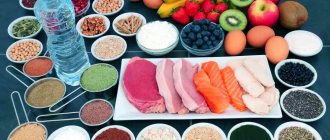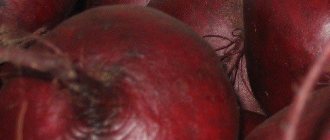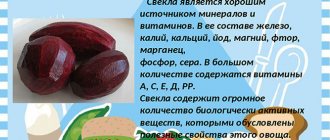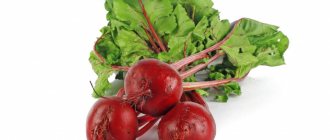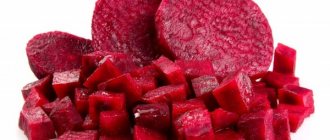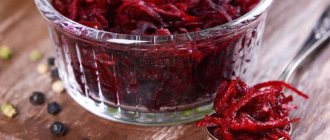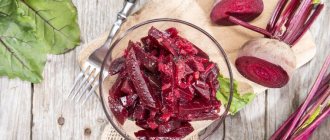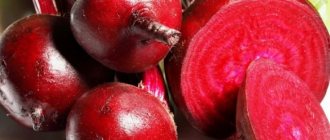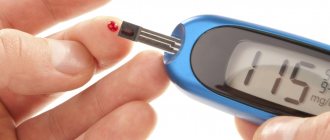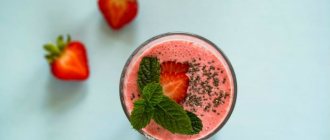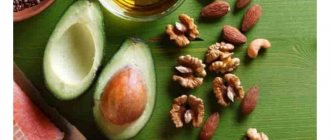Composition and nutritional value in beets
The vegetable contains the following vitamins: A, B1, B2, B3, B5, B6, B9, C, E.
In addition, it is rich in the following minerals:
Vitamins and minerals in beets.
- potassium;
- magnesium;
- calcium;
- phosphorus;
- sodium;
- boron;
- manganese;
- zinc;
- iron;
- sulfur;
- vanadium;
- copper;
- cobalt;
- chromium.
Nutritional value: 100 g of product contains 1.7 g of protein, 0.1 g of fat and 10 g of carbohydrates.
Both weakens and strengthens
In this regard, beets have long been competing with many laxatives. There are, of course, stronger drugs. But for moderate constipation or a tendency to it, ordinary beets can be considered the optimal drug, combining effectiveness and safety.
Article on the topic There is no need to cook. Healthy salads, snacks and kvass from fresh beets However, beets are now compared to medicines for other diseases. In 2008, that is, a little over 10 years ago, she was discovered to have the ability to lower blood pressure. And now, among the products, this is probably the most effective remedy for hypertension. In studies, 250 ml of beet juice per day actually reduced blood pressure in patients with prehypertension (pressure 130-140/85-90 mmHg). Moreover, beet juice had a complex effect: it not only reduced blood pressure, but also made blood vessels more elastic and weakened the inflammatory component. Thanks to this, the further development of hypertension and atherosclerosis is inhibited.
Scientists compared two types of juice - from raw and boiled beets. The effect was observed in both, but in the raw juice it was slightly stronger. Therefore, beets and the juice from them must be included in the diet, both at the onset of hypertension, when medications are not yet prescribed, and then, when constant drug treatment is prescribed. The ideal dose is from 250 to 500 ml of juice per day in 1-2 doses.
How do beets reduce blood pressure? It's all about those same nitrates that have been scaring us for many years. Beets, and not watermelons and apples, as the advertisement says, are the absolute champion in their content. It is nitrates that relax and protect blood vessels. It has already been proven that they are useful, and the harm attributed to them is mythical.
Article on the topic
Seduction in a plate. What foods are considered aphrodisiacs In connection with these nitrates, it is worth remembering that in ancient Rome beets were perceived as an aphrodisiac. Surprisingly, this has been confirmed in recent years. Nitric oxide is formed from nitrates in the body. But the content of this particular substance is increased by Viagra and similar drugs: nitric oxide itself helps men maintain their “reputation” during sex. So beets not only weaken, but also strengthen. Although not as strong as Viagra, it plays its role in this important matter. By the way, it is better not to abuse beets for men taking Viagra. An “overdose” of nitric oxide can occur, which significantly increases the risk of side effects.
Another nitrate paradox is the doping effect. Sports medicine experts have proven that beet juice increases physical activity and improves performance. For example, thanks to him, cyclists gained 11 seconds at a 4-kilometer distance, and 45 seconds at a 16-kilometer distance. Elastic vessels passed blood better and in greater quantities, oxygen starvation at a distance was less, and endurance was greater.
The same effect also helps those who have given up sports for a long time - people with vascular and respiratory insufficiency. They begin to suffer less from lack of oxygen. And improving blood flow in the brain protects against senile dementia (dementia). In a word, for problems associated with blood vessels, beets are a universal product and medicine.
Queen of vegetables. How to lose weight and look younger with the help of beets? More details
How many vitamins and minerals are in 100 grams of beets?
100 g of root vegetables contain vitamins (in mg):
- A - 0.002;
- B1 - 0.02;
- B2 - 0.04;
- B3 - 0.4;
- B5 - 0.1;
- B6 - 0.07;
- B9 - 0.013;
- C - 10;
- E - 0.1.
Amount of minerals:
- manganese - 66 mg;
- potassium - 288;
- sodium - 46;
- phosphorus - 43;
- calcium - 37;
- magnesium - 22;
- sulfur - 7;
- iron - 1.4;
- zinc - 0.4;
- boron - 0.28;
- copper - 0.14;
- vanadium - 70 mcg;
- cobalt - 2 mcg;
- chromium - 20 mcg.
How to prepare it - 4 medicinal recipes
To maintain the correct blood composition or increase hemoglobin levels, it is enough to eat a portion of borscht, beet salad or drink a glass of juice once a day.
The good thing about a vegetable is that it is tasty on its own, without additives, sauces or other ingredients. In combination with other products, its taste changes, and its usefulness increases significantly.
Beet juice
Beetroot juice is one of the 7 most beneficial juices for the blood.
To obtain it, take raw, unspoiled root vegetables, wash them thoroughly, peel them with a knife, cut them and pass them through an appropriate type of juicer.
You can grate it and then put it through cheesecloth, but this method is quite labor-intensive and looks untidy. There are two approaches to preparing and consuming beet juice:
- drink it only freshly squeezed;
- leave for 2-3 hours in the refrigerator to filter out the sediment, then drink.
The juice has a rich taste and can be diluted with water if desired. No salt, sugar or other seasonings are required.
Carrot juice mixture
The combination of beet and carrot juice is considered the most effective for renewing blood mass. First, you can take carrot as a basis, then gradually add beetroot to it, bringing the proportions to 1:1.
Salad with carrots and honey
All three ingredients are extremely beneficial for the circulatory system: they not only improve the composition of the blood, purifying it, but also thin the blood, lower blood pressure, dilate blood vessels and free their walls from adhering cholesterol.
It is prepared in this way:
- raw root vegetables are washed, peeled, and grated on a coarse or fine grater; you can take an equal number of them, or you can change the ratio in any direction;
- then honey to taste is added to the grated vegetables, a little lemon juice, which is also very beneficial for blood vessels; you can add some finely chopped walnuts: this product is also good for the circulatory and cardiovascular systems.
Salad with nuts and dried fruits
This product is suitable for salads, raw, boiled or baked: hemoglobin will increase in any case.
From grated boiled beets you can make a salad with lemon juice, sour cream or mayonnaise, prunes, walnuts and garlic. All components combine well in the dish and are all very beneficial for hemoglobin.
To prepare it you need:
- peel boiled, or better yet, baked beets;
- cut it on a coarse grater;
- add soaked and chopped prunes and chopped walnuts;
- peel the garlic and squeeze through a press or finely chop with a knife;
- add a little salt, season with a mixture of lemon juice and natural unrefined sunflower oil.
Lemon and unrefined directly pressed sunflower oil in combination with garlic can be considered a tasty dressing, or can be considered a real medicine that has a beneficial effect on the circulatory and cardiovascular systems.
Beetroot juice can be squeezed not only from the root crop, but also from the tops. This will significantly increase the nutritional value of the healing product.
Essential Nutrients and Calories
The root vegetable is considered a dietary product; 100 g contains only 42 kcal.
Beetroot contains the following nutrients:
Calorie content of 100 g of beets.
- proteins;
- carbohydrates;
- fats;
- water;
- organic acids;
- ash;
- starch;
- mono- and disaccharide substances;
- alimentary fiber.
How long to take beets to increase hemoglobin
The size of the daily serving of beets for raising hemoglobin levels usually depends on the amount of beneficial nitrates in it. Their ideal content is from 6.4 to 12.8 mg per kg of root crop. That is, 1 cup (136 g) of beets per day is quite enough. If you drink beet juice, you will need no more than 200 ml daily.
It is important to remember that correcting iron deficiency in the body will take time. Feeling may improve after a week of daily consumption of beets, but it may take several months or more for a sustained increase in hemoglobin levels in the blood.
Benefits of vegetables
Beets have a beneficial effect on the human body both raw and cooked. Juice is made from it, and soups are made from the tops. The root vegetable helps remove heavy metal salts from the body and prevents the development of cancer cells thanks to its betaine content.
This antioxidant normalizes liver function, regulates metabolism, prevents the occurrence of atherosclerosis, helps with Alzheimer's disease, osteoporosis, and has a positive effect on cardiac activity.
Including raw beets in the diet allows you to strengthen vascular and capillary walls, improve the functioning of the digestive system, replenish iron and iodine deficiency in the body, and lower blood pressure.
For women, the vegetable is useful during menstruation: B vitamins, iron and cobalt prevent anemia. It helps men increase muscle and sexual activity, and children cope with allergic reactions. It contains many antioxidants, vitamins B and U, the latter promotes better stomach function.
The root vegetable contains gamma-aminobutyric acid, which improves metabolic processes in the brain. Pectins and fiber effectively remove decay products from the body and prevent the growth of pathogenic microbes in the intestines.
The benefits of beets for the human body.
Dietary fiber from beets increases peristalsis, which is why the plant is recommended to be included in the menu for constipation. With the help of organic acids, food begins to be more actively digested.
Boiled
Boiled beets are more useful raw, especially if a person wants to lose weight. Betaine helps start fat oxidation processes, restore liver function, and improve the absorption of protein foods. Curcumin, contained in the root vegetable, interferes with blood supply to adipose tissue, helping to stabilize body weight.
Boiled vegetable has a laxative and diuretic effect. It has an analgesic and anti-inflammatory effect, fights depression well and relieves hangovers.
Beets are necessary for hematopoiesis, because... it includes microelements responsible for this process. Regular consumption of the root vegetable helps avoid the development of anemia. It also benefits pregnant women. Folic acid included in the composition is required for the proper formation of the fetal nervous system.
The culture is characterized by its iodine content, which is beneficial for iodine deficiency pathologies of the thyroid gland, and zinc, which increases visual acuity. By including root vegetables in the diet, the muscles' need for oxygen is reduced and endurance increases during active sports.
In beet juice
It is often used during a weight loss diet. Freshly squeezed juice promotes better heart function. By taking the drink every day, you can strengthen your immune system.
Beetroot juice thins the blood well, helps with blocked veins, thrombosis and liver diseases. To do this, it needs to be left for 2-3 hours. Zinc has a beneficial effect on the walls and mucous membranes of the rectum and stomach.
It is useful to drink beetroot drink for neoplasms. The juice contains substances that prevent cancer cells from developing and reduce the negative effects of chemotherapy on the body.
To achieve a positive effect, it is recommended to drink half a glass on an empty stomach. For skin cancer, dressings should be made using freshly squeezed beet pulp and juice.
The drink is beneficial for hypertension - it should be consumed three times a day after meals. Has a beneficial effect on the liver. If you drink it regularly, the bile ducts begin to cleanse and the functioning of the organ is normalized.
In addition, beet juice:
Beneficial properties of beet juice.
- increases the number of red blood cells;
- improves memory;
- dissolves excess calcium, thereby strengthening blood vessels;
- supports the functioning of the lymphatic system.
The drink helps women by eliminating discomfort due to blood loss during menstruation. Benefits pregnant women, relieving insomnia, stress and emotional instability.
It is also recommended for men to take it: it prevents the growth of adenoma and prevents the development of cancer. Zinc and B vitamins enhance the production of male sex hormones.
In beet leaves
Tops are extremely useful for the human body, because... she:
- helps with problems with blood vessels and heart;
- stimulates metabolism;
- benefits for pancreatitis and diabetes.
If you eat dishes made from beet leaves every day, you can alleviate the condition of gastrointestinal diseases, such as ulcers or gastritis. Fiber allows you to cleanse the intestines well and protect beneficial microflora from pathogenic ones.
Tops can be added to main courses, salads, and soups. After its use, hematopoiesis improves and the development of atherosclerosis is prevented.
The leaves contain a lot of phosphorus and iodine, so greens are beneficial for endocrine diseases and liver pathologies.
Contains a large amount of magnesium and calcium, which have a beneficial effect on the heart and affect the condition of cartilage tissue, teeth and bones. It is recommended that older people consume dishes with tops to prevent the development of osteoporosis and normalize the circulatory system.
Vitamins K, PP and U in the leaves, when taken regularly, lower blood sugar. Flavonoids protect the heart muscle, anthocyanins reduce inflammation and increase intestinal barrier function.
Ascorbic acid saturates the body with energy, B vitamins normalize the functioning of the central nervous system.
Beet varieties
According to the ripening period, beets are divided into early, mid-ripening and late. Below we provide a list of the most popular varieties of table beets in our region:
- "Egyptian" is an early variety. It has spherical fruits, a sweetish taste and small size (about 250 g).
- “Red Ball” is an early variety of beet with juicy and tasty pulp.
- “Vinegretnaya Marmaladka” is an early ripening variety with large fruits and dense pulp.
- "Bordeaux 237" is one of the most popular mid-season beet varieties, which is distinguished by its ease of care.
- “Pablo” is a mid-season beetroot species that grows on almost any type of soil. It lends itself well to long-term storage and is suitable for preparing any dishes.
If you suffer from urolithiasis, gastritis, hypotension or diabetes, consult your doctor before use.
- "Detroit" is one of the popular varieties of mid-season beetroot among summer residents. It has excellent taste and is characterized by high yield per square meter of crops.
- "Renova" is a late beet variety with cylindrical fruits. The pulp is dense, with a purple tint, and can be stored for up to 7 months.
- “Mona” is a late variety of beetroot with soft, juicy and aromatic pulp.
Contraindications for the use of beets
Eating root vegetables is prohibited for some chronic diseases. These include:
- stones in the kidneys;
- renal failure;
- hypotension;
- diseases of the gastrointestinal tract, bladder and kidneys;
- diarrhea;
- osteoporosis;
- osteochondrosis;
- diabetes;
- allergy to this vegetable.
Beetroot juice has a positive effect on kidney function, but the oxalic acid contained in beets can cause crystallization of the fluid in the organ. This aggravates the course of kidney stones and other pathologies of the bladder and kidneys.
Beet varieties
Ordinary beets are divided into three groups:
- dining room;
- sugar;
- stern
Table beets are divided into two main types: white and red. Differences in colors do not affect the taste in any way.
The white root vegetable tastes similar to its red comrade, but it is used in those dishes where the red color is undesirable. Table beets come in spherical and cylindrical shapes. The size and weight of the fruits vary from several grams to several kilograms.
There are also sunny yellow and striped beets, which breeders bred for decorative purposes, although such vegetables are also used as food.
Sugar beets are in most cases grown for industrial purposes for their further processing into ethanol and sugar. Such root vegetables are snow-white in color and contain up to 22% sucrose. Beetroot sugar is used as a natural sweetener for compotes, fruit salads, syrups, etc.
Fodder beets are grown for farm animals. It contains almost the same substances as the table root vegetable. The only difference is that fodder beetroot contains more fiber and protein. In addition, it is easier and more profitable to cultivate, as some specimens reach a weight of 20 kg or more.
In what form do beets retain more vitamins?
Raw root vegetables contain many minerals and biologically valuable substances. When cooked, the amount of ascorbic acid in it decreases slightly, but all trace elements remain unchanged.
As a result of exposure to high temperatures, the content of fruit acids in the vegetable, which cause intestinal irritation, decreases, and almost all of the nitrates, which can be allergens or carcinogens, are transferred to the decoction.
Thus, the vegetable is best consumed boiled. The amount of vitamins in it is almost identical to the raw product, but there are much fewer contraindications for taking it.
Contraindications and harm
Beets are not capable of harming a healthy person, since they do not contain dangerous chemical compounds in their composition. The root vegetable can only cause harm to people who have contraindications to its consumption (in some cases, this vegetable can be eaten, but in limited quantities):
- Regular intake of large amounts of beetroot can cause spasm of blood vessels. Therefore, it should be used with caution by people with vascular diseases and chronic migraines.
- Burak reduces blood pressure levels. This can have a negative impact on the health of hypotensive patients.
Sugar beets appeared in the selection process only in 1747.
- Beets are a natural laxative, so people who are prone to frequent diarrhea should eat this product in moderation or strictly limited amounts.
- It is better not to eat beetroot for people (or to use it in a limited manner, only after consulting a doctor) who suffer from acute or chronic gastritis with high acidity of gastric contents. For gastritis, you must adhere to a special nutritional system.
- Beet juice is contraindicated for urolithiasis.
- People suffering from diabetes should limit the amount of raw and cooked beetroot in their diet.
In this article, we talked about almost everything that every person needs to know about beets.
Now you know how to consume this vegetable for a particular disease, how to use it in cosmetology and cooking, as well as how to store it and choose it correctly in the market. Watch the video about the properties of beet juice
How to drink beet juice correctly
Drinking beet juice every day can lead to intolerance. Therefore, it can be mixed with oatmeal, horseradish and yogurt, which improve the taste of the juice.
If you have a sensitive stomach, beet juice can be mixed with oatmeal. Patients who have undergone irradiation can avoid unwanted reactions of the body if they regularly consume red beets during this period.
- Take 600 ml of juice per day.
- You need to drink juice at regular intervals from 100 to 200 ml at a time (5 to 6 times a day).
- When taken five times a day, drink the juice every 4 hours during the day and once at night.
- It is better to drink the juice on an empty stomach 10-15 minutes before meals. The juice should be slightly warmed up. Drink the juice in small sips, retaining the liquid in the mouth.
- The juice should not be consumed with yeast bread or washed down with sour juice. Yeast causes fermentation in the intestines, producing an acidic environment instead of an alkaline one.
- You should not drink freshly squeezed juice; the volatile substances it contains are toxic and cause nausea, vomiting, hiccups, drowsiness, and a drop in pulse and blood pressure.
- The juice should stand in the refrigerator for several hours. Remember that drinking fresh beet juice leads to absolute intolerance.
- In addition to taking the prescribed amount of beet juice, it is recommended to eat about 200 grams of boiled beets per day as a side dish.
- Treatment with beet juice should be carried out for a long time, without interruptions, for at least 6-12 months. In case of cancer, natural beet juice should be taken constantly.
Beets should not be perceived as a panacea and a cure for all diseases. Treatment of oncological diseases must be carried out taking into account the individual characteristics of the human body. Drugs that are useful for one person may not work for another patient.
How to cook beets. Which is healthier: raw or boiled beets?
There are many options for preparing beets. It can be eaten raw, cooked or fried.
We recommend
“Bifidobacteria and lactobacilli: signs of deficiency and products to replenish them” Read more
Raw beets are firm, crunchy and slightly sweet in taste. It can be used to make beet juice or added to smoothies and salads. Eating it raw ensures that it retains its nutrients and natural flavor.
When cooked, beets become softer and slightly sweeter. They are often paired with goat cheese or balsamic vinegar to balance out the sweetness, as well as arugula, which adds a nice peppery flavor to the earthy and sweet flavor of beets. Roasting also gives natural sugars a chance to caramelize and gives them a richer, sweeter flavor. Beets can also be boiled, steamed or stewed.
It is important to note here that although beets seem very resistant and tough, in fact they are still a very delicate vegetable. Beets are prone to oxidation and loss of some of their nutritional value when overheated and overcooked. So be sure to cook beets lightly to prevent oxidation and maximize nutritional value. Also, choose fresh beets instead of canned or pickled ones whenever possible to make sure you're getting as many nutrients as possible.
The healthiest way to cook beets to keep their nutrients intact is to either steam them for about 20 minutes or less, or roast them for an hour, which slowly softens them. The beets are roasted and ready when you can pierce them with a fork fairly easily.
How to cook beets without getting dirty?
One of the easiest ways to cook beets to avoid blemishes is to wrap whole beets in tin foil with a little coconut oil and bake at 350 degrees for about 45 minutes. Then place the entire bundle in the sink and slowly remove the skin (which will fall off easily) and allow the juices to drain into the sink rather than onto the table, hands or clothes.
Now that you know how to use beets, it's time to check out the best beet recipes.
What are its beneficial and medicinal properties?
Beets help fight many diseases. Its regular consumption helps to normalize the general condition of the body, improve complexion, get rid of excess weight and more.
Fights constipation. Due to the large amount of fiber, it has a mild but effective laxative effect and increases the number of natural bacteria in the intestines.- Prevents the development of cancer. Betaine contained in beets has an effect on existing cancer cells and prevents the formation of new ones, helping to improve blood composition.
- Fights iron deficiency anemia. It occurs due to bleeding. Beets contain a large amount of highly absorbable iron, which enriches the blood and saturates it with hemoglobin.
- Reduces blood pressure. Effectively fights atherosclerotic plaques, improving blood circulation.
- Helps in the fight against obesity. A low-calorie product that speeds up metabolism and cleanses the body.
- Prevents the occurrence of asthma. Rich in vitamin C, which improves the functioning of the respiratory system.
- Normalizes hormonal levels. Boron normalizes the production of hormones by the body.
- Reduces the risk of stroke. Potassium with regular consumption of beets strengthens blood vessels.
Is it possible to eat beets during pregnancy?
Oddly enough, during pregnancy, beetroot dishes are tolerated very well. Medical professionals advise pregnant women to eat beets daily for the following reasons:
- it is rich in various vitamins, minerals, carotenoids, pectins and organic acids, due to which pregnancy proceeds without problems and the child develops fully;
- beets are an effective and safe remedy for constipation;
- if the need arises, microenemas are given based on beet juice;
- The root vegetable is used to lower blood pressure, which is sometimes necessary in the 3rd trimester;
- It is useful to eat beets throughout pregnancy to maintain normal hemoglobin levels and prevent possible fetal hypoxia.
If during diagnosis you are found to have a hemoglobin level in your blood below normal, there is no need to despair. This disease can be effectively treated by following the doctor's instructions. You should always keep in mind that pills and other medications will certainly cure your illness, but at the same time they can have a negative effect on other organs. And recipes based on traditional medicine can be used by everyone and they are completely safe and no less effective than medications.
Follow a healthy lifestyle, get rid of bad habits, walk more in the fresh air, balance your diet. By fulfilling all these wishes, you will thereby prevent a decrease in hemoglobin in the blood, and you will not have to think about how to bring it back to normal.
I like it I don't like it
Do beets increase hemoglobin?
Beetroot juice is endowed with a lot of positive properties that are useful for various systems and organs.
Scientific research has revealed that the substances that make up beets have the best effect on the composition of the blood and the functioning of the heart and blood vessels. The vegetable, as part of various dishes, is recommended for people suffering from diseases of the hematopoietic and cardiovascular systems.
Important!
Beetroot juice has a very rich flavor and does not require the addition of sugar or any seasonings.
If you drink 30 g of drink daily for 4 weeks or eat 100 g of boiled product, this will certainly lead to an increase in the amount of hemoglobin. Present in beets in an accessible form - iron salts, protein, various amino acids and vitamins - can regulate hematopoiesis and normalize blood composition.
For better absorption of the juice, it is not recommended to drink it immediately. It will be better if it stands for 1-2 hours in the refrigerator before use.
Attention!
There will be no harm from such a combination of different juices, and the benefits will only increase.
How does it affect hemoglobin?
It is no coincidence that many people associate the red-orange color of the root vegetable with its benefits for the circulatory system. Everything in it really seems to be designed to improve blood composition.
This vegetable has a particularly good effect on hemoglobin levels, due to the high content of iron and other elements that help in its absorption.
It is noteworthy that you can improve your blood composition in this way by consuming carrots in all forms: raw, boiled or baked, as well as in the form of juice.
The nutritional and healing power of the root vegetable increases in combination with other products:
If, for vision, carrot juice should be consumed with cream so that carotene is absorbed, then to increase hemoglobin, it is ideal to mix carrot juice with beet, lemon, and grapefruit juice. The fact is that iron from plants is less easily absorbed in combination with milk. But iron from proteins contained in meat, liver, eggs is better absorbed together with vegetables containing vitamin C. Therefore, a good option would be to eat meat products in combination with a salad of carrots, tomatoes or other vegetables.
